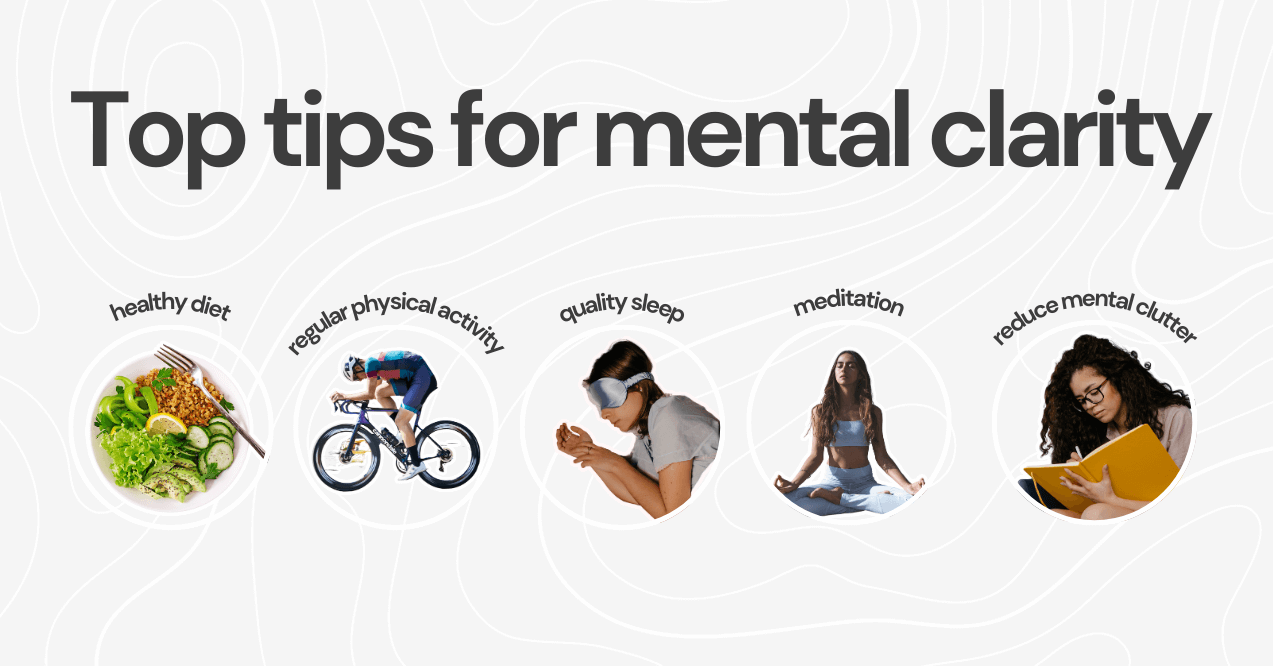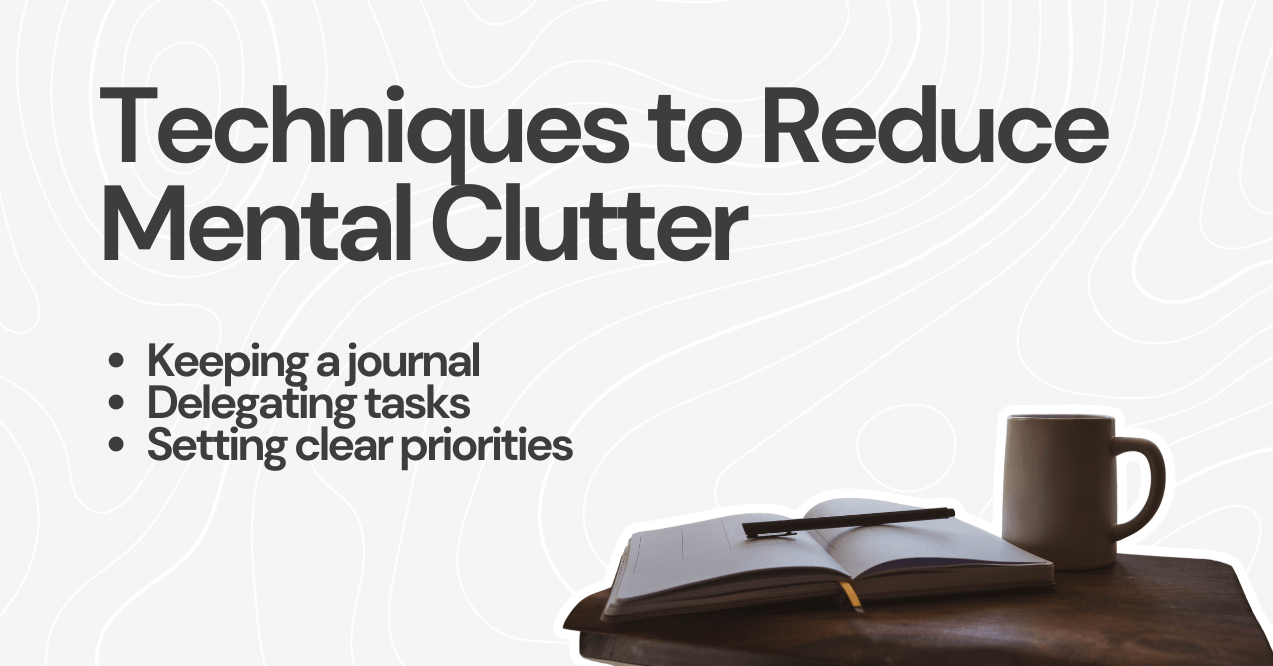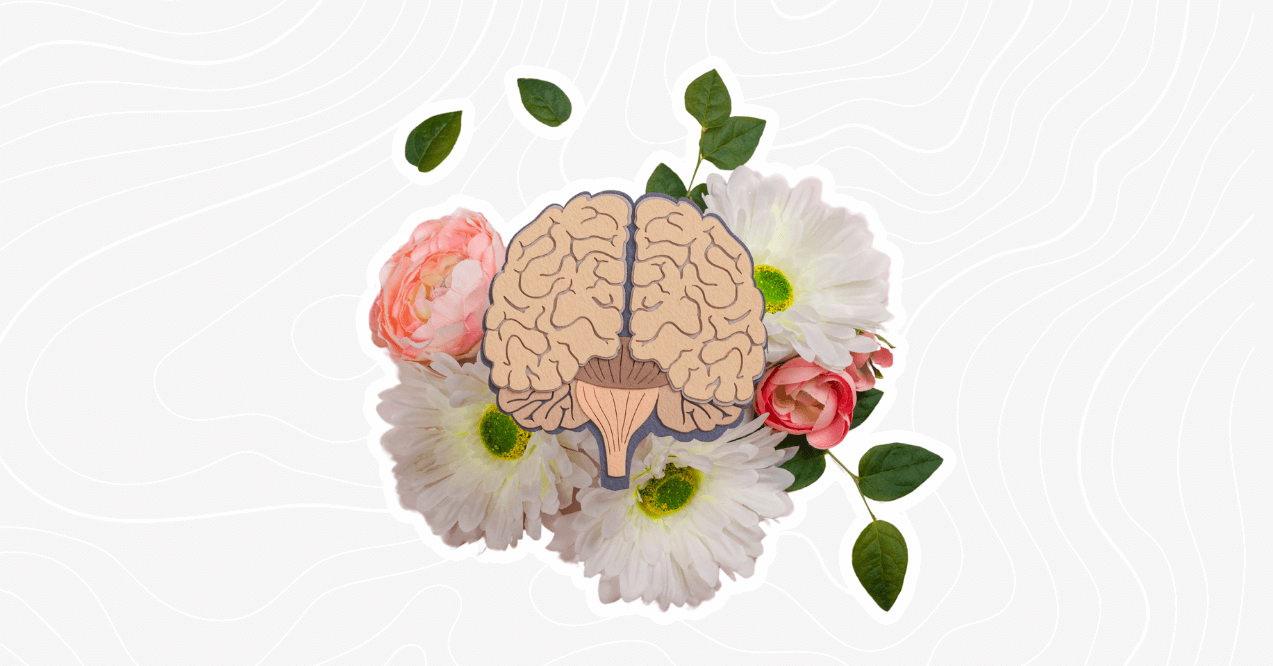Top 5 Tips for Mental Clarity and Productivity
In our modern, fast-paced world, mental clarity is not just a luxury, but a necessity for navigating life effectively. Having a clear mind enhances our decision-making abilities, amplifies our focus, and optimizes our daily productivity. Moreover, enhancing mental clarity can improve mental health, reducing feelings of confusion, stress, and overwhelm. But how do we cultivate this state of clear-headedness amidst the whirlwind of life’s demands?
This article answers that question by guiding you through five essential techniques for promoting clear thinking and productivity. We will explore practical, science-backed tips ranging from maintaining a balanced diet, emphasizing hydration, and the transformative power of regular physical activity. We will delve into the rejuvenating influence of quality sleep and the calming impact of mindfulness and meditation.
But the journey doesn’t end there. One of the hidden gems we’ll uncover in our quest for mental clarity is the consumption of the best supplements for focus and concentration, particularly organic superfood powders and herbs for mental clarity. These nutrient-dense supplements are game-changers in the realm of cognitive health, and we’ll be thoroughly exploring their benefits in this comprehensive guide. So, get ready to embark on a journey towards a sharper mind, more productive days, and an overall enhanced sense of well-being.
Key findings:

Understanding Mental Clarity
Many people seek natural solutions like the best tea for mental clarity and best mushrooms for mental clarity to enhance their cognitive function. Mental clarity is a concept that refers to the optimum functioning of our mind, a state of cognitive excellence that facilitates effective decision-making, sharp concentration, and efficient problem-solving. It’s the state of mind where you have unimpeded mental vision, providing you with the capacity to focus, be productive, and maintain a high level of mental health. Imagine sailing on a calm sea, where the water is crystal clear, and you can see the depths below. That’s what mental clarity feels like – it’s a clear perspective that allows you to navigate life’s complexities with grace and ease.
When we talk about a clear mind, we refer to the ability to process information accurately, interpret nuances, and make sound, unbiased decisions. It’s about understanding complex situations, appreciating different perspectives, and formulating well-thought-out responses rather than impulsive reactions. This cognitive clarity is not just about being intelligent or having knowledge; it’s about being mentally agile and adaptable.
Moreover, mental clarity significantly contributes to productivity. With a clear mind, procrastination is replaced with purposeful action, and distractions lose their appeal. You can concentrate on tasks, complete them more efficiently, and thus, get more done. It’s like having a well-tuned engine that works at its best capacity, propelling you towards your goals.
Importantly, mental clarity has profound implications for our mental health. A clear mind helps in managing feelings of overwhelm, mitigating anxiety, and reducing stress. It promotes emotional stability, fostering a sense of peace and well-being. By cutting through mental fog, you can manage your emotions better, deal with life’s challenges more effectively, and build stronger, more fulfilling relationships.
Top Tips for Mental Clarity

Understanding mental clarity and its impact on our lives is the first step towards cultivating it. As we delve deeper into this article, we will explore practical strategies to enhance your mental clarity and elevate your cognitive well-being if you’re suffering from brain fog from allergies or any other reason.
Tip #1: Healthy Eating, Hydration, and Superfood Powders
In our quest for improved productivity and mental clarity, we often focus solely on mind-oriented activities and exercises. However, our physical health and daily habits also significantly impact our cognitive abilities.
Among these, diet and hydration form the cornerstones of a healthy mind-body ecosystem. Moreover, there is an emerging emphasis on the role of superfood powders, which are concentrated versions of nutrient-rich foods, in complementing our diet. In this section, we will delve deeper into these areas, highlighting their importance in achieving mental clarity.
Diet for the Brain
Our mental clarity is influenced significantly by the quality of our diet. Consuming a diverse range of fruits, vegetables, lean proteins, and whole grains can help nourish our brains and promote clearer thinking. These food groups offer a wide variety of essential nutrients. For those looking to optimize their wellness journey, understanding the best supplements for digestion, best vitamins for gut health, and exploring the best smoothies for gut health can provide additional support. Additionally, antioxidants in fruits and vegetables, amino acids in lean proteins for neurotransmitter production, and sustained energy from the complex carbohydrates in whole grains.
Hydration
Hydration is a fundamental aspect of cognitive health that is often overlooked. Given the significant proportion of our brain composed of water, even mild dehydration can disrupt cognitive functions and affect our mood. Therefore, ensuring sufficient water intake throughout the day is a crucial aspect of maintaining mental clarity.
Superfood Powders
Superfood powders, which are concentrated versions of nutrient-rich foods, offer a straightforward way to enhance your nutritional intake. Best mood enhancing supplements usually pack a range of vital nutrients, antioxidants, and beneficial compounds known to support brain health and cognitive functions.
These powders can contain various healthy ingredients such as spirulina, wheatgrass, beetroot, and berries. Each ingredient brings unique health benefits. For those seeking enhanced vitality, considering the best supplements for energy and best supplements for cell regeneration can complement these superfoods. Additionally, many find relief from digestive discomfort by incorporating the best tea for bloating into their routine. Now, let’s explore the main benefits:
- Spirulina – is a good source of antioxidants and plant-based protein.
- Wheatgrass – offers a bounty of vitamins and essential minerals.
- Beetroot – may help increase blood flow to the brain.
- Berries – are associated with delayed brain aging and improved memory.
Incorporating superfood powders into your diet can be as simple as adding a scoop to your smoothie or sprinkling it over your salad.
Remember, achieving mental clarity is a holistic process. The journey goes beyond these dietary changes and adequate hydration. It also encompasses regular physical activity, quality sleep, mindfulness, and mental decluttering, all of which we’ll explore further in this article.
Tip #2: Regular Physical Exercise
As we continue our exploration into strategies for enhancing mental clarity, we turn our attention to the often underestimated but crucial role of physical exercise. More than just a way to build muscles and cardiovascular health, physical exercise is an integral part of our cognitive health and clarity. In this section, we will delve into the different ways physical exercise contributes to mental clarity and provide examples of activities that can help in this journey.
A Holistic Approach to Exercise
While many associate physical exercise with building muscles or improving cardiovascular health, its impact stretches beyond these physical benefits. Regular exercise also serves as a cornerstone for achieving mental clarity. It supports brain health and cognitive functions, laying the foundation for a clear mind and efficient thinking.
The Benefits of Physical Exercise
Engaging in regular physical exercise enhances blood flow to the brain, providing it with an increased supply of oxygen and essential nutrients. This improved blood flow stimulates the production of chemicals in the brain that boost the growth of new brain cells and connections, fostering cognitive enhancement.
Moreover, exercise is an excellent stress buster. It promotes the release of endorphins, often referred to as the ‘feel-good’ hormones. These endorphins help reduce feelings of stress and anxiety, which can otherwise cloud our thinking and hinder mental clarity.
Physical exercise also contributes to better sleep quality. Adequate sleep is crucial for our brains to process and consolidate information from the day, making way for clear thinking when we wake up. Regular exercise helps regulate our sleep cycle, ensuring we get restful sleep each night.
Exercise Options for Mental Clarity
Many activities promote both physical fitness and mental clarity.
- Yoga – combines physical movement with mindfulness, making it an excellent choice for those seeking to boost mental clarity.
- Running, cycling, or even brisk walking – increase heart rate, improving circulation and aiding the brain’s health and function.
Incorporating regular physical activity into your routine can have significant benefits for your mental focus. It enhances blood flow to the brain, reduces stress, improves sleep, and ultimately contributes to better mental clarity.
Tip #3: Quality Sleep
The importance of quality sleep in the pursuit of mental clarity cannot be overstated. When we sleep, our brains get a chance to rest, rejuvenate, and reorganize, improving mental clarity and cognitive functions. Sleep provides the brain with the much-needed downtime to process and consolidate information from the day, allowing for clearer thinking when we wake up.
The Science Behind Sleep and Cognitive Function
During sleep, our brains go through various stages, each with its unique restorative function. Deep sleep, for instance, aids in memory consolidation, while REM sleep, where most dreaming occurs, helps stimulate regions of the brain used for learning. Lack of quality sleep can disrupt these processes, leading to impaired cognitive function, including diminished mental clarity and decision-making skills.
In addition, during sleep, the brain cleans its house of impurities that build up during the day. Sleep allows the spaces between brain cells to widen, helping flush cellular waste and memory-clogging beta-amyloid plaques through its glymphatic system and drain into the body’s lymphatic system for elimination. That’s why your brain feels foggy-headed and sluggish after a restless night and poor sleep.
Techniques to Improve Sleep Quality
Improving sleep quality is fundamental to achieving mental clarity. Here are some clear-thinking tips to enhance your sleep:
- Consistent sleep schedule – our body follows a circadian rhythm, an internal clock that regulates sleep-wake cycles. Sticking to a consistent sleep schedule, even on weekends, can help reinforce your body’s sleep-wake cycle and promote better sleep.
- Exposure to morning sunlight – our body’s circadian rhythm is sensitive to the light/dark cycles of the sun. Spending a minimum of 15-30 minutes in the sunshine between 8:00 am and 10:00 am (without sunglasses) can help reset your circadian rhythm, improve sleep, and increase mental alertness during the day.
- Conducive bedroom environment – make your bedroom a sleep-friendly environment. This can include controlling the temperature (cooler temperatures often promote better sleep), using blackout curtains to ensure darkness, and reducing noise levels.
- Avoid blue light exposure before bedtime – electronic devices emit blue light, which can interfere with the production of melatonin, a hormone that regulates sleep. Consider limiting the use of these devices for at least two hours before bedtime and dim the lights to help your body prepare for sleep.
Incorporating these tips into your routine can significantly enhance your sleep quality, thereby boosting your mental clarity and overall cognitive performance.
Tip #4: Mindfulness and Meditation
As we navigate the journey towards improved mental clarity, mindfulness and meditation emerge as key techniques to explore. These practices are more than mere relaxation tools. They foster a deep sense of awareness, reduce mental noise, and promote clear thinking, thereby directly enhancing our mental focus and cognitive performance.
Techniques to Enhance Mental Clarity
Mindfulness and meditation come with a range of techniques that are accessible even to beginners. Here are a few to consider:
- Focused breathing – this simple technique involves focusing your attention solely on your breath, observing each inhale and exhale without trying to alter your breathing rhythm. This practice can help bring your mind back to the present moment and improve mental clarity.
- Body scans – this involves paying close attention to different parts of your body, from your toes up to your head and can help you develop a greater awareness of your physical presence, aiding in mental clarity.
- Guided meditations – for beginners, guided meditations can be a helpful way to get started. You can find numerous guided meditations online focusing on various topics, including enhancing mental clarity.
Incorporating mindfulness and meditation into your routine can be a powerful way to improve mental clarity and overall cognitive health.
Tip #5: Reducing Mental Clutter
As we strive to achieve mental clarity, many find success with the best brain supplements for adults and ashwagandha for brain fog. Additionally, exploring the best supplements for mental clarity and best mushrooms for health and immunity can support overall cognitive wellness. One essential aspect to consider is the reduction of mental clutter. Mental clutter is the congestion of thoughts, tasks, and concerns that occupy our minds, often leaving us feeling overwhelmed and foggy. It’s the cacophony in our heads that hinders clear thinking, impedes our decision-making capabilities, and diminishes our overall cognitive performance.
Techniques to Reduce Mental Clutter

Reducing mental clutter involves proactive strategies to manage our thoughts and tasks more effectively. Here are a few mental focus techniques that can help declutter your mind and enhance mental clarity:
- Keeping a journal – journaling is a powerful tool to clear your mind. It helps in organizing thoughts, reflecting on emotions, and planning tasks. By writing down your thoughts and worries, you can offload some of the mental burdens, thereby creating space for clear thinking.
- Delegating tasks – it’s impossible and unnecessary to do everything yourself. Learn to delegate tasks to others when possible. Delegating not only lightens your workload but also helps clear the mental space occupied by those responsibilities.
- Setting clear priorities – prioritizing tasks can reduce feelings of overwhelm. By determining what truly matters and focusing your energy on those tasks, you can effectively reduce mental clutter.
Incorporating these techniques into your routine can significantly help manage mental clutter, paving the way for improved mental clarity and enhanced cognitive health.
In our quest for mental clarity, one avenue that holds substantial promise is the incorporation of superfood powders into our diet. These powdered forms of superfoods pack a potent punch of essential nutrients, providing a concentrated source of elements that are beneficial for our brain health and cognitive functions.
The Power of Superfood Powders
Certain superfoods have been recognized for their cognitive-enhancing properties. For instance, spirulina, a frequent ingredient in superfood powders, is rich in antioxidants and boasts strong anti-inflammatory properties. It also helps produce the happy hormone, serotonin, reducing stress and improving mood, making it a valuable contributor to mental clarity. Some other superfoods known to support brain health include:
- Blueberries – these are rich in antioxidants that may delay brain aging and enhance memory.
- Turmeric – its active compound, curcumin, crosses the blood-brain barrier, directly entering the brain and boosting neuronal growth and mental clarity..
- Broccoli – contains potent antioxidants, B vitamins, and vitamin K that support nerve regeneration and preserve memory..
Including superfood powders that contain these ingredients in your daily diet can be as simple as adding a spoonful to your morning smoothie or bowl of oatmeal.
Boosting Mental Clarity with Superfood Powders from Trumeta
Among the myriad of products on the market, one that stands out is the USDA Certified Organic Trumeta Metabolic Reds. This superfood powder blend incorporates ingredients like beetroot, raspberry, and strawberry, all of which have been studied for their potential benefits on brain health.

Beetroot, for instance, is known to improve cognitive and athletic performance. And berries like raspberries and strawberries are rich in antioxidants that contribute to the brain’s detoxifying “housekeeping,” promoting clear mental clarity and healthy brain aging.
Utilizing premium quality superfood powders like those from Organic Trumeta provides an effective and convenient way to boost your nutrient intake and support mental clarity.
Final Thoughts
As we draw this discussion to a close, it’s essential to remember that mental clarity is not just a state but a journey. It’s a holistic approach encompassing various facets of our lives – from our diet and physical activities to our sleep patterns, mindfulness practices, and the use of health-boosting superfoods. All these elements work in synergy to pave the path towards a clearer, more focused mind.
By implementing above-mentioned strategies, you can experience improvements in your mental focus, productivity, and overall brain health. Incorporating superfood powders into your wellness routine can provide a nutritional boost to support your journey towards mental clarity. Products like USDA Certified Organic Trumeta Metabolic Reds can supplement your diet with potent, brain-boosting nutrients derived from superfoods, contributing to improved cognitive performance and mental clarity.
Regardless of where you are in your journey towards mental clarity, remember that each day offers a new opportunity for improvement. Start today, one step at a time, and embrace the journey towards a clearer, more focused mind.
A balanced diet with nutrient-dense foods such as fruits, vegetables, lean proteins, and superfood powders supports brain health. Superfood powders like spirulina, beetroot, and berries offer antioxidants and essential nutrients that promote mental clarity and cognitive function.
Regular physical exercise enhances blood flow to the brain, stimulates new brain cell growth, and releases endorphins, reducing stress and boosting mental clarity. Activities like yoga, running, and cycling can support cognitive health.
Quality sleep is vital for mental clarity, helping the brain consolidate information, clear toxins, and restore cognitive function. Techniques like consistent sleep schedules, avoiding blue light before bed, and creating a sleep-friendly environment can improve mental focus.
Advertisement. This site offers health, wellness, fitness and nutritional information and is designed for educational purposes only. You should not rely on this information as a substitute for, nor does it replace, professional medical advice, diagnosis, or treatment. If you have any concerns or questions about your health, you should always consult with a physician or other health-care professional. Do not disregard, avoid or delay obtaining medical or health related advice from your health-care professional because of something you may have read on this site. The use of any information provided on this site is solely at your own risk.





